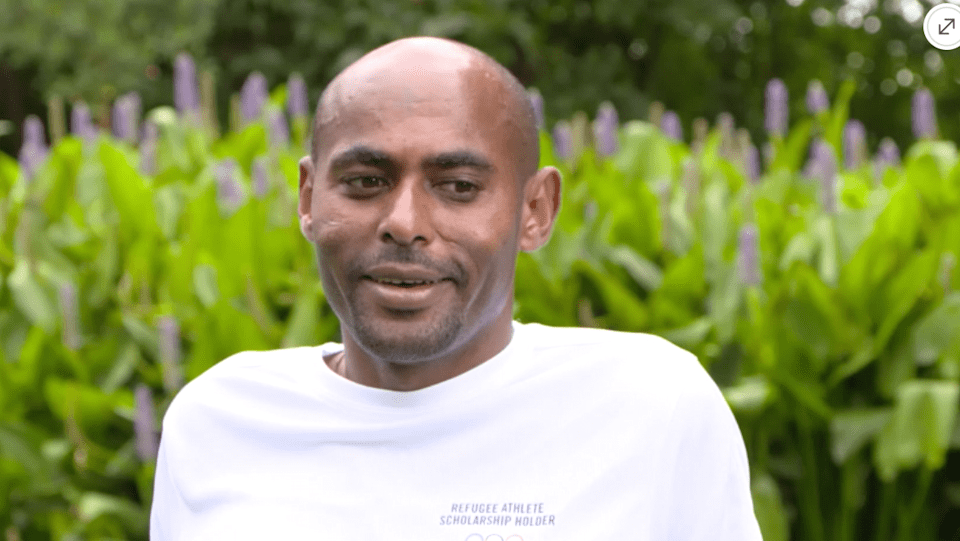
With the sun barely peeking over the Melbourne skyline on a warm February morning, Abere Kassw Belay was already deep into his morning run, speeding across a vast field at Footscray Park.
Coach Frances Lipscombe looked on, eyeing Abere’s posture and running cadence, glancing down every once in a while at the watch clad on her wrist.
Kassw Belay is an Ethiopian native who in 2017 sought asylum in Australia while competing in a marathon there, citing rising violence in his region and an increased threat his family members were living under at home.
He is an IOC Refugee Scholarship holder, and while he won’t be competing at the Olympic Games Tokyo 2020, his story is emblematic of so many hard-working refugees around the world: He’s passionate about life and – most poignantly for Abere – running.
“I love [to] run... and just... my life is running,” he told Olympics.com.
June 20 marks World Refugee Day, and Kassw Belay is one of millions of refugees who have sought a better life in a foreign land away from their home. He has lived in Australia since 2017, and at times has worked in a food-processing plant, often balancing a demanding work schedule with daily training for his running.
“He is just astounding to me – the things that he has been through, and yet he is always smiling,” said Lipscombe, a local coach based in Melbourne. “[All of] his hard work is so committed to achieving his dream. It just... you just get pulled along in the enthusiasm. So, yeah, he's terrific. I really, really admire and respect him."
The challenge of adapting - and an accident
In late 2018, Kassw Belay suffered a workplace accident, his left hand being caught in a food processing machine. He lost his middle finger and severely damaged others on his hand, greatly reducing the use of it – and requiring multiple surgeries and skin grafts thereafter.
“Manually, he can't do any anything” with that hand, Lipscombe explained. “But obviously it's okay for running. There was a lot of uncertainty: ‘What was going to happen?’ ‘How would he earn a living?’ ‘How would he ever get back to his running?’
"So when he finally he got the scholarship, I was just so happy. [There was a] change in his appearance, let alone his whole demeanor. It's been amazing.” - Frances Lipscombe
The relationship between Kassw Belay and Lipscombe is a special one, even with Abere’s limited English. They speak in running terms, about pacing and stride patterns and how he’s holding his shoulder over his frame. There is a lot of body language – and laughter.
For Kassw Belay, it’s another layer of adapting.
“If she is not my coach, I just maybe stop training because she's endured the time, only just coming every day, every little thing [that] I needed,” Abere said of Frances. “And she [will] just speak to [my] physio, and counselor. She is great to work [with]... she's like family. She's very nice. [Not] only just for me... for other people.”
“She's very nice family and not just family,” he added. “I am lucky that she is my coach.”
“I would say Abere’s capacity to adapt is pretty good,” said Lipscombe. “We've managed to find venues around [Melbourne] that are kind of similar to the type of situation that he would be in were [he] training in Ethiopia. The biggest downside for him would be not having the massive group of athletes to train with. But, you know, he takes it all in his stride. And that's what it is, I guess, is his attitude and he just gets on with it.”
“The prize is the big thing: Running again in a professional capacity.”
No Tokyo, but no doors closed
While Tokyo is out of the picture, Kassw Belay is undeterred. When he speaks about running, he often cites his training times, the splits he’s achieved, his marathon and half-marathon times, all of which have been hard to come by with lockdowns and quarantines coming in waves in Melbourne over the last 16 months.
But the word he puts the most emphasis on in discussing the sport: “Happy.”
“And just in my motivation... it's good,” he said, citing the scholarship as a key part of that. “Every day, it's more good. More training. My life is good now.”
Lipscombe said that she and Kassw Belay aren’t closing any doors on training, fully keeping Paris 2024 – now just three years away – in view.
Lipscombe has this message by the runner she’s so inspired by: “Abere, you are a wonderfully talented athlete. You're a hardworking athlete; you can achieve your dreams. And I'll be behind you 100 percent. The entire time.”
Two lives – not just one – changed by a sport, and a refugee athlete’s drive to be his best.
